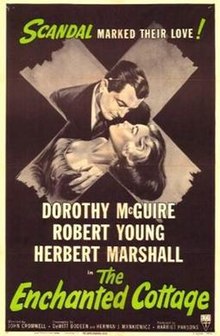The Enchanted Cottage (1945 film)
| The Enchanted Cottage | |
|---|---|

Theatrical poster
|
|
| Directed by |
John Cromwell Fred Fleck (assistant) |
| Produced by | Harriet Parsons |
| Screenplay by |
Herman J. Mankiewicz DeWitt Bodeen |
| Based on |
The Enchanted Cottage 1923 play by Arthur Wing Pinero |
| Starring |
Robert Young Dorothy McGuire |
| Narrated by | Herbert Marshall |
| Music by | Roy Webb |
| Cinematography | Ted Tetzlaff |
| Edited by | Joseph Noriega |
| Distributed by | RKO Radio Pictures |
|
Release date
|
|
|
Running time
|
91 minutes |
| Country | United States |
| Language | English |
The Enchanted Cottage is a 1945 romantic fantasy starring Robert Young, Dorothy McGuire, and Mildred Natwick.
It was based on a play by Arthur Wing Pinero. The Enchanted Cottage was previously adapted for the silent screen in 1924, with Richard Barthelmess and May McAvoy as the newlyweds.
When socialite Army Air Force pilot Oliver Bradford (Robert Young) is disfigured by war wounds, he hides from his family, including his mother (Spring Byington) and his fiancée (Hillary Brooke) and decides to live in seclusion in the seaside New England cottage he had rented from its current owner, Mrs. Minnett (Mildred Natwick), for his originally planned honeymoon.
Laura Pennington (Dorothy McGuire) is a shy, homely maid who has hired on as the cottage's caretaker. Oliver and Laura gradually fall in love and discover that their feelings for each other have mysteriously transformed them. He appears handsome to her and she seems beautiful to him. This "transformation" is perceived only by the two lovers (and the audience). Laura believes that the cottage is "enchanted" because it was once rented to honeymoon couples, and in time the widowed Mrs. Minnett reveals the true story behind the cottage's enchantment legend.
Arthur Wing Pinero's 1923 play was filmed in 1924 as a timely story involving physical and emotional disabilities following the First World War. RKO Producer Harriet Parsons acquired the rights for her studio for an updated World War II version set in New England. When RKO management took the film away from her and gave it to producer-writer Dudley Nichols, Hollywood columnist Hedda Hopper wrote a strongly-worded newspaper editorial criticizing RKO for gender bias. The outcry from the column led RKO to change its plan and give the property back to Harriet Parsons.
...
Wikipedia
